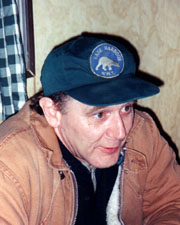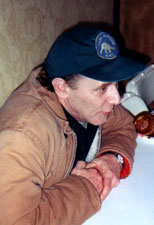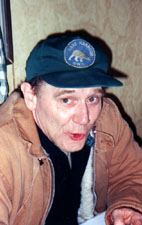
North of 60 Interview: Timothy Webber
An outsider who ends up marrying into the Lynx River family, Harris Miller is the
laconic band manager who keeps the town's books in good order--but would
rather be at the river fishing.
For the six years of the series and in the subsequent movies, actor Timothy Webber
has taken Harris through a wide range of experiences and emotions. During the
filming of "Another Country," I had the chance to talk with him about "North of 60" and
some of his other roles. "North of 60" publicist Fran Humphreys was also with us.
Note: The section entitled "'Another Country' from the fish's point of view" has some
spoilers for that movie.
Harris' story
PW: Were you presented with a backstory about how Harris Miller wound up in Lynx River?
TW: A little bit. A lot of it developed through the first season. They brought in backstory elements over the first couple of years. We had a little bit of backstory, although I don't think originally he was even from the Maritimes, although eventually he ended up being from there.

|
PW: Not only did he end up in Lynx River, but how did he end up being the band manager?
TW: Well, I think he's a bit of a loner. And a lot of people from the East Coast do drift to the north.
PW: Really?
TW: Oh yeah. Tons of my cousins have worked up north, and my uncles. It's not unusual at all.
PW: Why do you think that is?
TW: That's where there's work. You get paid really well. They're really tough. The Maritimes are tough. They can work hard and in dire conditions for long shifts.
PW: So they're used to a rugged life.
TW: They are. It's part of their heritage really.
PW: So you figure that's what happened with Harris?
TW: I think that's sort of how he started up here. And then obviously he must have had a bit of an education. He probably went to university for a couple of years.
PW: Enough to be able to do business stuff.
TW: Yeah. And he probably ended up in this town, or maybe worked with someone from this town in Yellowknife or something like that, and then became friends with Peter. And when the job became available, he asked for it and got it--probably much to his surprise.
PW: There can't be a whole lot of white band managers.
TW: Actually, that was my first question when they put this to me, and they said actually there are quite a number of them.
PW: Really? Because they're the ones who've traditionally had more business training?
TW: There is that, but also it's sort of like one of the same reasons actors have agents: because you can separate yourself emotionally from negotiations. At least that's how it was explained to me. And part of it was certainly at the time not a lot of natives had the know-how to do it.
PW: I can see that, though, the benefit of having a neutral third party.
TW: That's sort of the notion, yeah.
Good Harris/bad Harris
PW: Harris is pretty much a good guy, but he has done some pretty underhanded things.
TW: Yeah, Harris is an opportunist. Not quite so much so as some other people...[Webber looks at Lubomir Mykytiuk and everyone laughs.] Basically he's got a good heart, and he wouldn't do anything illegal.
PW: Of course, the obvious incident to mention early on in the show is when he sabotages Teevee's band manager trainee application. Wait a minute--we don't even have to go as far as that. In the very first episode, he calls Yellowknife to try to get rid of Eric.
TW: Yeah, well, he doesn't like cops, period. Never did. Never will. He's matured a little over the years, I guess, but he dislikes cops.
PW: So it was nothing specific against Eric? Harris just wanted Michelle to be the only cop he had to deal with?
TW: Exactly. And then I slyly try to invite Eric and his wife and Sarah to dinner at my place together, but they don't fall for that. I thought that would have been interesting. That's just partly, I'm just trying to make trouble. And that happened in a number of business dealings, too, that he tried to kind of get a little bit on the side. It was nothing ever specifically illegal, although there was a little insider stock trading once. But I'm never successful at it.

|
PW: I guess the reason he tried to sabotage Teevee's application was...
TW: It was pretty obvious. That was his job.
PW: But he was already dating Lois by then, so sabotaging her son's job opportunity wasn't smart from that angle.
TW: There was certainly a conflict of interests there. Questionable ethics, yes.
PW: The other low point for Harris is when he finds out Lois is pregnant and literally runs away from fatherhood.
TW: Yep.
PW: Not exactly the most mature reaction.
TW: Nope. I would have to agree. Not the most mature character in the world. He just, he panicked and he ran. He certainly loved Lois, but I think he saw the child as a bit more commitment than he bargained for. I don't know whether they weren't using birth control, or it failed...who knows?
FH: She was Catholic.
TW: Oh, that's right. She was going through a religious phase at that time.
PW: That reminds me: we've never seen any followup to Harris' own religious experience [in "I Shall Not Want"]. Do you have any feelings about whether that changed him at all?
TW: Certainly. They didn't write anything in, so obviously he didn't become a Bible thumper or a born-again Christian. But I think it did have a more perhaps profound effect on him, because since then he does seem to have matured and mellowed somewhat, and accepted his place in life. I think always before there was the possibility of moving on, whereas I think now he's firmly rooted in this place. Even marrying Lois, I think he still always kept a window open. I think if anything, it affected him that way.
PW: That sounds reasonable, because during that experience, he really realized how much Lois meant to him.
TW: And this place, and the whole community.
PW: I don't think he's bailed out on anything or anyone since.
TW: No, not that I'm aware of, that I can remember. I think he's been pretty solid ever since then.
"Another Country" from the fish's point of view
PW: In this movie, "Another Country," what's Harris up to?
TW: Are you sworn to secrecy? [laughs]
PW: Don't worry! I'll make sure not to spoil things for people before the movie airs. So go ahead and say whatever you like.
TW: Well obviously, Harris is not involved with what's going on in Calgary. But he does get somewhat involved with hiding Teevee and making arrangements for that once Teevee's back in town. That's basically it. Another thing he's working on is he tries pulling some strings--not very successfully.
PW: He tries to pull some strings to get Teevee released?
TW: Yeah, to get Teevee released. At least on bail. In terms of the hydro deal, I think on the one hand he'd like to see it, and on the other hand he wouldn't. Because I think he knows it would essentially destroy what he loves about the north. But as I say, he's always got his eye out for some little deal on the side. If he can make some money, that'd be a great thing. The other problem he obviously would have with it--in my mind anyway--is that it would probably destroy every spawning bed within a hundred miles.
PW: [laughs] Spoken like a true fisherman! You actually do like to fish a lot, right?
TW: Yes, I do. And Harris has been established as a fairly avid fly fisherman throughout the years. That was just one of those things that was a neat thing to work into the show.
PW: I can just see that being Harris's main concern about the dam! Forget the jobs, forget the electricity. What's it gonna do to the fish?
TW: As I say, I think he loves [that area]. You know, he could have chosen to live in Yellowknife or one of the larger, sort of more industrialized towns of the north. But he didn't. He chose to come here. And if this dam was built, Lynx River or somewhere near here would become another industrialized northern town, and I don't think he wants that kind of life.
Ten years of "North of 60"
PW: So are you happy with where Harris has gone over the past ten years?
TW: Oh yeah. I've had some interesting rides along the way. It's certainly not one of the key players, but certainly involved. And as I say, there's been some interesting stuff that I've been able to play with. It's been a gas for the most part.
FH: It's pretty extraordinary that we're still here. Have you reflected on that at all?
TW: Oh yeah. Mostly "Oh my god, I can't believe we're here!" And "Is it really ten years?!" The show is a quality show, and it's nice to be involved with something like that. It's got a strong fan base, and they're greatly appreciated. I just love coming here. It's so nice every year to come back to see everybody. And it's a gorgeous place. It's unbelievable. It's better than a high-school reunion, because you get paid. [all laugh]
PW: But you live in British Columbia, which is not exactly an ugly place, either.
TW: Oh no, that's true. But I'm a big fan of southern Alberta. It's great trout fishing here. Not this week...it's a little cold this week.

|
PW: You seem to keep coming back to that subject!
TW: Well, you know, there's fishing, and then there's everything else. [all laugh]
FH: "I can't believe we're here" is so much the resonant feedback about the tenth anniversary.
TW: I know. It's like when the thing started, you figure maybe a season or two, maybe three. But ten years...and more to come, apparently. If the people want to see it, I'm more than happy to come back.
FH: I hear you got recognized at 7-11 last night.
TW: Yeah, actually that happens more now. If you can judge by the number of times you're recognized, when it was on during the day, it seemed like there was twice the audience than when it was on in the evening.
FH: I think there's this critical mass thing that goes on, and the reruns have been a phenomenon. I've been in touch with the same people in CBC Audience Relations over the years, and they get feedback all the time by email and by phone, and they have to do a ticket log every time they get asked a question.
I get the weekly reports on all the different CBC TV shows, and they were blown away probably two years ago when "North of 60" first went onto daytime. It's no longer on daytime, but the calls that they're getting, they're coming out of the woodwork. I don't know where they were when the nighttime show was on.
TW: I know. I couldn't believe the number of people who are coming up to me.
PW: Fran, do you know how many calls CBC was getting?
FH: No, but it was more than they got for any other show.
TW: It just tells you how high the unemployment rate is in this country!
PW: That so many people are watching television at 1:00 in the afternoon?
TW: Yeah. [all laugh]
FH: There was obviously a new audience for the show in the daytime.
TW: Oh yeah, a whole brand-new audience. 'Cuz it's tough at night, you know. You're fighting the big American shows. It's a difficult place to be, primetime. I mean, we were on against "Seinfeld," I seem to recall.
FH: But we did well against "Seinfeld." We did well against "E.R." The year that we went off the air from a series point of view, 1998, TV Guide did a survey about which series will you miss the most, and by about 30 percent, we were ahead of "Ellen" and "Seinfeld" in the Canadian audience. But the daytime thing really created a cult following that didn't exist before.
Other roles
PW: You got a Genie nomination for "My Father's Angel." It takes place in Canada, but I believe it involves two refugees from Bosnia?
TW: It's two refugees who essentially bring their hatred with them. I play the Serbian, and another guy played a Muslim. By some strange fateful coincidence, our lives become entwined, and then it's just interaction over the course of the movie between the two of us, the adults, and then we each have a son who also gets involved. I don't want to tell too much about it, but it was a very nice film.
PW: Was that a more emotional role than many others you've done?
TW: Yes, it was a heavy piece of work. It was difficult to do. But it was such a nice film and a nice script that as an actor, you want that kind of thing. But yeah, it was a tough one to do. Especially because while we were filming, this stuff was still going on. It was right at sort of the peak.
FH: Frank Borg wrote that, and he's one of the writers on "Da Vinci's Inquest."
PW: Oh, is he? Well, I was just going to ask about "Da Vinci." I saw the guest appearance you made on that series. Again, we don't want to give away too much, because there's a twist in the plot, but the storyline was about spousal abuse. How did you like working on that show?
TW: I loved it. I know the people--most of the actors, and the director. I know Chris Haddock [the creator of DVI] fairly well.
PW: Had you worked with him before?
TW: I'd worked with him on another show.
PW: Which was...?
TW: "Mom P.I." That was also where I first worked with Stuart Margolin, who's now on "Tom Stone."
"Tom Stone"
PW: In "Tom Stone," you play an RCMP officer.
TW: I do.
PW: You're in the commercial crime unit in Calgary where Janet Kidder's character, Marina di Luzio, has been assigned after taking the fall for a failed case in Toronto.
TW: Yeah, and I've been there for probably most of my career. Getting close to my retirement. Maybe ten years away or something like that.
PW: He sounds like a long-suffering character.
TW: He's sort of a bit like that. He's a little crusty and downtrodden. Although he dislikes [Marina] at first, he starts to kind of take a liking to her. And she starts to wake up the cop in him again, 'cuz she's kind of a breath of fresh air. She's unconventional in her approach.
PW: So we'll see some changes in your character as time goes along?
TW: I don't know. We'll see.
PW: But you'll be back next season.
TW: Apparently I will be back next season. But I'm not sure what they're going to do with the character, what kind of arc or whatever they're going to do with him.
FH: It's a good dry sense of humor that's perfect for Tim.
PW: Are you in most of the episodes?
TW: Umm, most of them, not all of them. Some more than others. Much like "North of 60." Sometimes I'm there for a scene, sometimes I'm somewhat featured.
PW: Now, since you live in B.C., did you have to keep coming back to Calgary, or did they schedule all of your scenes in a group?
TW: Nope, just back and forth. It's kind of like commuting. It's only an hour...well, the jetstream goes east, so coming to Calgary it's about an hour and five minutes, and going home it's about an hour and 25.
PW: Not that you've been counting! [laughs]
TW: Sometimes that's difficult when you're back and forth, back and forth, back and forth, but usually they try and arrange things so I'll come in for a few days or a week and then be gone home for a while.
PW: Do you have any other projects lined up besides probably the second season of "Tom Stone"?
TW: At the moment, no. I've got a soft offer on some feature film that I haven't heard back on yet.
PW: Well, thank you for your time. Before you leave, would you like to take a moment to say hi to the fans?
TW: Sure. Hey, I'd like to say this is Timothy Webber, "Harris" on North of 60, and I'd just like to say hello to all the North of 60 fans out there, and thanks for keeping us alive.
[ Click here to hear that greeting.]
Text and photos (c) 2002 Patricia F. Winter.
All rights reserved. For personal use only. Do not distribute to other persons by electronic or non-electronic means (including posting on a web site) without prior permission from the copyright owner.
Last updated 6/19/09